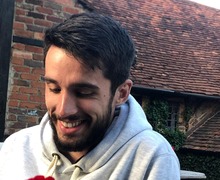Interview with Justin W. Flory and Michael Nolan
Freedom and AI: Can Free Software include ethical AI systems?. Exploring the intersection of Free software and AI


Justin W. Flory and Michael Nolan will give a talk about Freedom and AI: Can Free Software include ethical AI systems?. Exploring the intersection of Free software and AI at FOSDEM 2020.
Q: Could you two briefly introduce yourselves?
Justin W. Flory is a creative maker. He is best-known as an open source contributor based in the United States. Since 2018, Justin is a leading member of the LibreCorps program of the FOSS@MAGIC initiative at the Rochester Institute of Technology. He was the first, full-time co-op placement to work exclusively on community issues for UNICEF Office of Innovation. This was work he did in concert with UNICEF personnel and Red Hat Open Innovations Lab on UNICEF’s MagicBox effort. Since then, Justin led workshops for UNICEF’s Innovation Fund to introduce over 20 international start-up teams to the Open Source way. Currently, he works as a consultant for open source projects and community-building. Using Justin’s initial efforts with MagicBox as a starting point, RIT’s current LibreCorps mentors build interactive resources for clients.
Mike Nolan is a software engineer and open source community strategy consultant working with the UNICEF Innovation Fund to assist in developing sustainable open source community strategies. The other half of his time, he’s working as a core contributor for the OpenMined project, helping to build an open source framework for privacy preserving, federated, machine learning. With work experience stemming from tech companies such as Amazon and GIPHY to large humanitarian organizations such as the International Rescue Committee and UNICEF, he seeks to blend the best of fast-paced technology development with the policy-driven world of humanitarianism.
Q: What will your talk be about, exactly? Why this topic?
How do we make an AI system more ethical and respect our rights?
Our talk is about creating a vision. The Free Software community formed around four basic freedoms of software: freedom to read software source, to run it how you like, to remix and make changes, and to redistribute your changes with others. But now, we live in a world where software is making automated decisions for us. Artificial intelligence is more than just software, but it is also about data and predictive models. So, our talk is about creating a vision of AI systems that respect our freedoms and how we might go about designing such systems.
Q: What do you hope to accomplish by giving this talk? What do you expect?
The history of the Free Software movement teaches us a lot about how we got to where we are today. We want to inspire our audience to think critically about artificial intelligence from our collective perspective as members of the Free Software community, and also give the audience some concrete ideas to take away for how we tackle this together as a global community. The values, ethics, and history of the Free Software movement are an essential part of what we are presenting.
Q: What has changed over the last 20 years in the domain of AI systems?
The answer is probably in your pocket or your hand.
Today, AI is everywhere around us. More decisions are being automated for us by machines. Sometimes this results in positive changes, like early detection of cancer. Other times, the changes are harmful, such as a predictive model to detect early stages of cancer being less effective on people of color. In today’s world, “ethics and AI” are being talked about more, but the conversations are in small pockets. From our perspective, we are seeing societal changes in our humanitarian work, driven by AI systems. “Fairness criteria” and removing bias is not enough. We can’t program our way out of this one.
If the past 20 years saw the proliferation of automated decision-making, we need to envision, together, the next 20 years that create AI system that protect our essential freedoms as users.
Q: 2020 marks the 20th anniversary of (F)OSDEM. What contributions has FOSDEM made to the advancement of FOSS, or how did you in particular benefit from FOSDEM?
FOSDEM is unique to us as a collection of various disciplines and backgrounds across the Free Software world. As such, we felt that it would be an excellent venue to debut our talk to explore AI and our essential freedoms as users and designers of automated systems.
Q: Have you enjoyed previous FOSDEM editions?
This is not our first time coming to FOSDEM and we are glad to be a part of this 20-year tradition in Brussels. FOSDEM has always been an opportunity for us to connect with other folks in the Free Software world and learn what other people are doing. We are looking forward to sharing our knowledge and learning from others this year!

Creative Commons License
This interview is licensed under a Creative Commons Attribution 2.0 Belgium License.